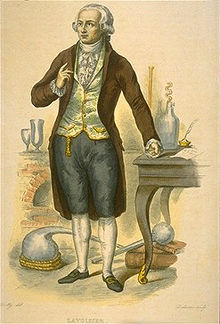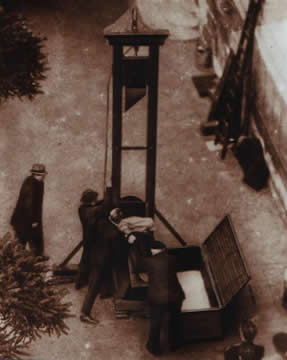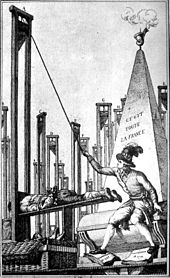Republic needs neither scientists nor chemists
 Antoine Lavoisier
Antoine Lavoisier
Lavoisier was a powerful member of a number of other aristocratic councils. Lavoisier was also an administrator of the major tax collectors in tax farming system. All of these political and economic activities enabled him to fund his scientific research. As the French Revolution gained momentum from 1789 on, Lavoisier's world inescapably collapsed around him. At the height of the French Revolution, he was accused of selling adulterated tobacco and of other crimes. In 1792 Lavoisier was forced to resign from his post on the Gunpowder Commission and to move from his house and laboratory at the Royal Arsenal. On 8 August 1793, all the learned societies, including the Academy of Sciences, were suppressed. It is difficult to assess Lavoisier's own attitude to the political turmoil. On 24 Nov. 1793, the arrest of all the former tax gatherers was ordered. Lavoisier was branded a traitor by the Convention under Maximilien Robespierre during the Reign of Terror, in 1794.
Lavoisier and the other former tax gatherers were formally brought to trial on 8 May 1794. According to a story, the appeal to spare his life so that he could continue his experiments was cut short by the judge: "The Republic needs neither scientists nor chemists; the course of justice cannot be delayed." Lavoisier was convicted with summary justice of having plundered the people and the treasury of France, of having adulterated the nation's tobacco with water, and of having supplied the enemies of France with huge sums of money from the national treasury. Lavoisier was tried, convicted, and guillotined on 8 May 1794 in Paris, at the age of 50. 27 of his former colleagues, were also guillotined on the same day.
Lavoisier's importance to science was expressed by Joseph Louis Lagrange who lamented the beheading by saying: "It took them only an instant to cut off this head, and one hundred years might not suffice to reproduce its like."
A year and a half after his death, Lavoisier was exonerated by the French government. When his private belongings were delivered to his widow, a brief note was included, reading "To the widow of Lavoisier, who was falsely convicted".
Antoine Lavoisier (August 1743 – 8 May 1794) is widely considered to be the "Father of Modern Chemistry". He recognized and named oxygen and hydrogen.
Guillotine - for swift death
 Last public execution take place in France. Eugene Weidmann, six-time murderer, is about one second away from losing his head.
Last public execution take place in France. Eugene Weidmann, six-time murderer, is about one second away from losing his head.
The guillotine is a device designed for carrying out executions by decapitation. It consists of a tall upright frame in which a weighted and angled blade is raised to the top and suspended. The condemned person is secured at the bottom of the frame, with his or her neck held directly below the blade. The blade is then released, to fall swiftly and separate the head from the body.
From its first use, there has been debate as to whether the guillotine always provided a swift death as Guillotine had hoped. With previous methods of execution intended to be painful, there was little concern about the suffering inflicted. As the guillotine was invented specifically to be humane the issue was seriously considered. The blade cuts quickly enough so that there is relatively little impact on the brain case, and perhaps less likelihood of immediate unconsciousness than with a more violent decapitation, or long-drop hanging.
Some doctors say that it takes 15 minutes before a chopped head loses its eye and hearing senses. Audiences to guillotinings had told numerous stories of blinking eyelids, speaking, moving eyes, movement of the mouth, even an expression of "unequivocal indignation" on the face of the decapitated head.
The Reign of Terror
 Robespierre guillotining the executioner, after having guillotined everyone else in France
Robespierre guillotining the executioner, after having guillotined everyone else in France
The Reign of Terror (5 September 1793 – 28 July 1794), was a period of violence that occurred after the onset of the French Revolution, incited by conflict between rival political factions, the Girondins and the Jacobins, and marked by mass executions of "enemies of the revolution". The death toll ranged in the tens of thousands, with 16,594 executed by guillotine (2,639 in Paris), and another 25,000 in summary executions across France. The guillotine (called the "National Razor") became the symbol of the revolutionary cause, strengthened by a string of executions: King Louis XVI, Marie Antoinette, and others such as pioneering chemist Antoine Lavoisier, lost their lives under its blade.
During 1794, revolutionary France was beset with conspiracies by internal and foreign enemies. Within France, the revolution was opposed by the French nobility, which had lost its inherited privileges. The Roman Catholic Church was generally against the Revolution, which had turned the clergy into employees of the state. In addition, the First French Republic was engaged in a series of wars with neighboring powers intent on crushing the revolution to prevent its spread. Through the Revolutionary Tribunal, the Terror's leaders exercised broad dictatorial powers and used them to instigate mass executions and political purges.
The repression accelerated in June and July 1794, a period called the Great Terror, and ended in the coup of 27 July 1794, leading to the Thermidorian Reaction, in which several instigators of the Reign of Terror were executed, including Saint-Just and Robespierre. The Thermidorian Reaction was a revolt in the French Revolution against the excesses of the Reign of Terror.